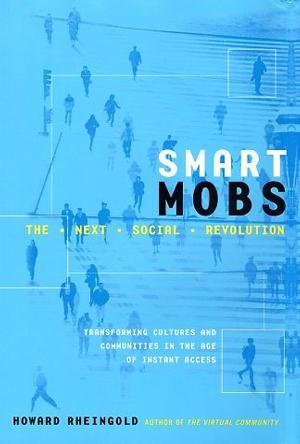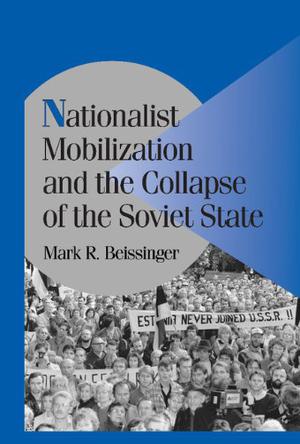-

Collective Violence, Contentious Politics, and Social Change
-

Smart Mobs
How the convergence of mobile communications and computing is driving the next social revolution-transforming the ways in which people meet, mate, work, buy, sell, govern, and create. When Howard Rheingold sneaks off down an untrodden trail, everyone else follows. He is always onto something marvelous no one has seen before. An ever-considerate guide, he navigates this new world with ease, compassion, and grace, and gives you the inside story, with no punches pulled. Tech talk? Howard could get your mother to understand. From Tokyo to Helsinki, Manhattan to Manila, Howard Rheingold takes us on a journey around the world for a preview of the next techno-cultural shift-a shift he predicts will be as dramatic as the widespread adoption of the PC in the 1980s and the Internet in the 1990s. The coming wave, says Rheingold, is the result of super-efficient mobile communications-cellular phones, personal digital assistants, and wireless-paging and Internet-access devices that will allow us to connect with anyone, anywhere, anytime. From the amusing ("Lovegetty" devices in Japan that light up when a person with the right date-potential characteristics appears in the vicinity) to the extraordinary (the overthrow of a repressive regime in the Philippines by political activists who mobilized by forwarding text messages via cell phones), Rheingold gives examples of the fundamentally new ways in which people are already engaging in group or collective action. He also considers the dark side of this phenomenon, such as the coordination of terrorist cells, threats to privacy, and the ability to incite violent behavior. Applying insights from sociology, artificial intelligence, engineering, and anthropology, Rheingold offers a penetrating perspective on the brave new convergence of pop culture, cutting-edge technology, and social activism. At the same time, he reminds us that, as with other technological revolutions, the real impact of mobile communications will come not from the technology itself but from how people use it, resist it, adapt to it, and ultimately use it to transform themselves, their communities, and their institutions. -

The New Transnational Activism
From labor organizers to immigrant activists, from environmentalists to human rights campaigners, from global justice protesters to Islamic militants, this book shows how ordinary people gain new perspectives, experiment with new forms of action, and sometimes emerge with new identities through their contacts across borders. It asks to what extent transnational activism changes domestic actors, their forms of claim making, and their prevailing strategies. Does it simply project the conflicts and alignments familiar from domestic politics onto a broader stage, or does it create a new political arena in which domestic and international contentions fuse? And if the latter, how will this development affect internationalization and the traditional division between domestic and international politics? -

Nationalist Mobilization and the Collapse of the Soviet State
This 2002 study examines the process by which the seemingly impossible in 1987 - the disintegration of the Soviet state - became the seemingly inevitable by 1991, providing an original interpretation not only of the Soviet collapse, but also of the phenomenon of nationalism more generally. Probing the role of nationalist action as both cause and effect, Beissinger utilizes data and case studies from across the USSR during its final years to elicit the shifting relationship between pre-existing structural conditions, institutional constraints, and event-generated influences in the nationalist explosions that brought about the collapse of the Soviet Union. As Beissinger demonstrates, the 'tidal' context of nationalism - i.e., the transnational influence of one nationalism upon another - is critical to an explanation of the success and failure of particular nationalisms, why some nationalisms turn violent, and how a crescendo of events can overwhelm states, periodically evoking large-scale structural change in the character of the state system. -

抵抗的全球化(上下)
《抵抗的全球化(套装上下册)》的构想颇为宏大,首先以世界为整体,包括了北方与南方。这样的安排是建基于一种信念,即新旧形态的全球化是在各地人民之间交织着不平等的互相依存的关系网络,因此,任何好的变革必须在国家、全球的各个层面推展。本文集试图讨论现实中各个方面的议题——经济、政治、社会、意识形态、文化——因为不希望遗漏任何重要的议题。 -

Regimes and Repertoires
Review "This book will be invaluable to any doctoral students or researchers interested in the contentious area of political and conceptual study."-Matt McCullock, H-Net Review (Matt McCullock H-Net Review ) "In Regimes and Repertoires, Charles Tilly is at his inventive and wide-ranging best. Tilly takes us into the minds of rulers and rebels to examine how their opportunities and choices have shaped each others' actions. Using a simple but powerful theory of regime types and a rich array of historical and contemporary cases, he provides fresh new explanations for the variation in modern political struggles, from peaceful protest to genocide and terrorism. This small book bursts with big ideas."--Jack Goldstone, George Mason University (Jack Goldstone ) Product Description The means by which people protest—that is, their repertoires of contention—vary radically from one political regime to the next. Highly capable undemocratic regimes such as China's show no visible signs of popular social movements, yet produce many citizen protests against arbitrary, predatory government. Less effective and undemocratic governments like the Sudan’s, meanwhile, often experience regional insurgencies and even civil wars. In Regimes and Repertoires, Charles Tilly offers a fascinating and wide-ranging case-by-case study of various types of government and the equally various styles of protests they foster. Using examples drawn from many areas—G8 summit and anti-globalization protests, Hindu activism in 1980s India, nineteenth-century English Chartists organizing on behalf of workers' rights, the revolutions of 1848, and civil wars in Angola, Chechnya, and Kosovo—Tilly masterfully shows that such episodes of contentious politics unfold like loosely scripted theater. Along the way, Tilly also brings forth powerful tools to sort out the reasons why certain political regimes vary and change, how the people living under them make claims on their government, and what connections can be drawn between regime change and the character of contentious politics.